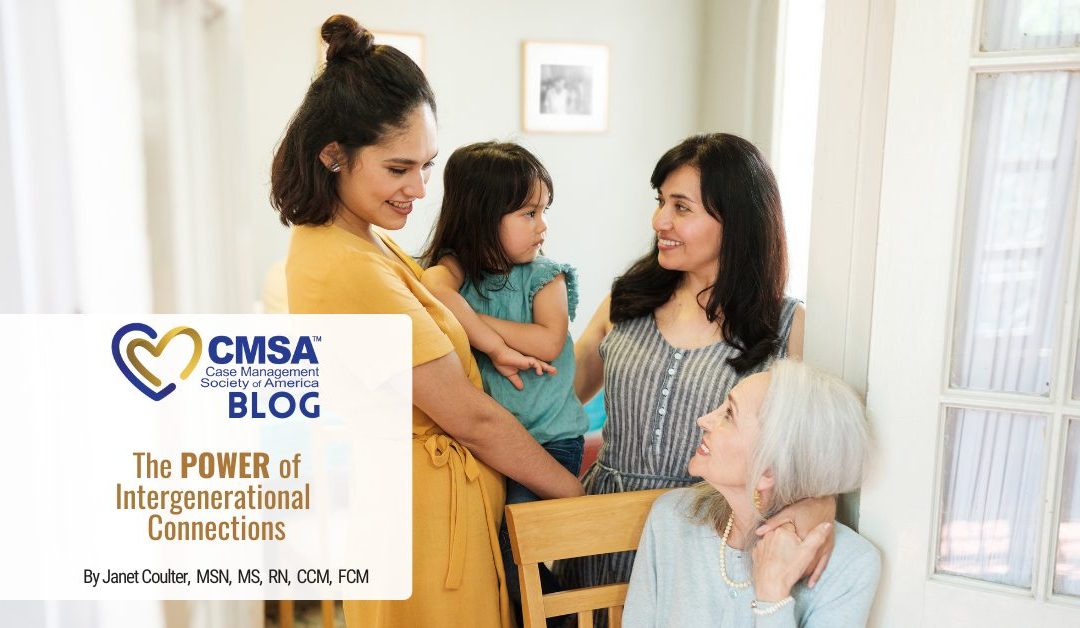By Janet Coulter, MSN, MS, RN, CCM, FCM
September has been designated as Intergenerational Month. It is a time to connect generations and to prompt folks from varying age groups to make friends with and learn from each other. Celebrating our differences and strengths will assist generations to connect with other generations and to work together. Reaching across generations and connecting with younger and older people can help to decrease social isolation and improve health. Connecting with others can impact quality of life as it has physical, mental, and emotional benefits. Connections help individuals feel valued, heard, and seen. The need for love and belonging transcends generations and should be experienced by all ages.
Several communication methods may need to be used to be successful. Baby Boomers tend to value face-to-face communication while millennials prefer text or instant messaging. Successful communication may involve a compromise or the use of a variety of methods to communicate. Sharing a conversation over a meal is a great place to start. We can learn from each other, which can lead to a better understanding of the challenges and history that may separate one generation from another. When communicating with other generations, put stereotypes of that generation aside. Stereotypes are generalities that are not universal and tend to lead to assumptions that may not be true. Studies show the benefits of increased social interaction include lowering the risk of Alzheimer’s and dementia, improving heart health, lowering the risk of depression, and lowering stress. Research by Leschak and Eisenberger (2019) shows social relationships can reduce inflammation and improve antiviral responses, while lack of social relationships can suppress immunity.
According to Brubaker and Brubaker (1999), generations can successfully work together. They found that there are four Rs needed for strong intergenerational relationships: respect, reciprocity, responsibility, and resiliency. Respect is important in any relationship. Responsibility in intergenerational relationships can be shaped by race, religion, gender, culture, and socioeconomic status. Reciprocity has mutual benefits. It’s a two-way system that can ease life’s challenges. Each generation has its own set of strengths and weaknesses and can benefit from relationships with other generations. Resiliency is vital for successful intergenerational relationships by providing ongoing support and long-lasting connections.
There are several ways you can celebrate Intergenerational Month. If you are fortunate enough to have relatives of a different generation, reach out to them. Grandparents, parents, aunts, uncles, cousins – these relationships are imperative for the transfer of traditions, culture, and knowledge from one generation to the next. Intergenerational relationships can strengthen bonds and provide for the continuation of family traditions and culture. A great way to start is to call your parents and grandparents. It’s no coincidence that Grandparents Day is in September!
Building an intergenerational relationship with someone outside the family may take intentional effort. Your clients may be from different generations with different values, communication styles and views on life. Developing open communication and trust with them is vital. The ability to communicate effectively with other generations is central to our role as case managers. Showing respect is so important. Open communication can help you to better understand them and their needs. They may not have physical needs. They may have issues related to social isolation and depression. Making a connection can be vital to their health and well-being. Intergenerational connectedness is vital to our role as case managers. My challenge to you is to reach out to someone from another generation. Listen to their stories and their views on life. We can learn so much from each other!
Elevate Your Case Management Skills with CMSA's ICM Training! Registration is NOW OPEN for our Fall Integrated Case Management (ICM) Training, Oct 31 - Nov 2. Boost your career in case management with expert training: https://www.pathlms.com/cmsa/courses/57720 Be a part of the first class to experience the newly structured Integrated Case Management training using the new Integrated Case Management manual (2nd Edition) + Earn 26 RN, SW, and CCM credits!
Bio: Janet Coulter, MSN, MS, RN, CCM, FCM is a transplant case manager with a wide variety of experiences including educator, administrator, team leader, and Director of Case Management. Janet holds a Master of Science in Nursing from West Virginia University and a Master of Science in Adult Education from Marshall University. She has published many articles in CMSA Today and the Professional Case Management Journal and served as a reviewer for the Core Curriculum for Case Management Third Edition. She currently serves as Chair of the CMSA Today Editorial Board and Secretary of the CMSA Foundation board. Janet was the recipient of the CMSA National Award of Service Excellence and Southern Ohio Valley CMSA Case Management Leadership award and was recently inducted as a Case Management Fellow from CMSA.


Great blog with a wealth of insights!! We can learn so much from others that may vary from those in our own generation. Thank you!!
Great post Janet! I especially like your idea of the important role intergenerational connectedness plays in case management.